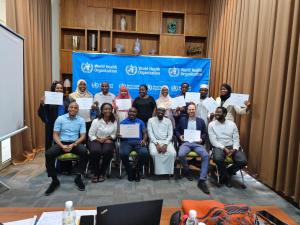Zanzibar finalizes costed National Action Plan to fight Antimicrobial Resistance
Zanzibar - With support from WHO, the Ministry of Health of Zanzibar and the Ministry of Natural Resources, Irrigation, and Livestock have finalized the costing and budgeting of its National Action Plan (NAP) on antimicrobial resistance (AMR) for 2025–2029.
Using the WHO Costing and Budgeting Tool, this costed NAP is essential for identifying funding gaps and mobilizing additional resources to ensure that prioritized interventions are effectively implemented.
The exercise reaffirmed Zanzibar’s commitment to a coordinated, multisectoral response to AMR. Stakeholders were trained on the tool and subsequently applied it to cost prioritized activities outlined in the national AMR plan.
Dr. Fedjo Tefoyet, Thomas Galbert, Team Lead for Universal Health Coverage Life Course at WHO, underscored: “Convening AMR stakeholders in Zanzibar under a One Health approach has helped us map out exactly where the funding gaps are and how we can address them. This exercise gives us a clear path forward to strengthen our coordinated response and ensure we have the resources needed to implement our AMR plan effectively.”
Beyond finalizing the costing exercise, WHO led the strengthening of local technical capacity, with cost coordinators now well-skilled to utilize the WHO tool to cost other strategic plans and train additional stakeholders.
For Muhiddin Omar, AMR Coordinator at the Ministry of Health, he noted: “Using the WHO tool has given us a clear picture of what our activities will cost and where we need more funds. I will like to further express our deepest appreciation to WHO for convening stakeholders and also training officers with this very important tool.”
A high-level multisectoral event is planned to officially endorse the costed NAP. The next phase will focus on mobilizing resources from both local and international partners to support the full implementation of prioritized activities in Zanzibar’s AMR strategy.
Communications Officer
WHO Country Office, United Republic of Tanzania
Tel: +255 744377899 (Phone)
Email: adjeidum [at] who.int (adjeidum[at]who[dot]int)
NPO/Quality of Care
Office: +255 22 113005
Email: mremar [at] who.int (mremar[at]who[dot]int)
